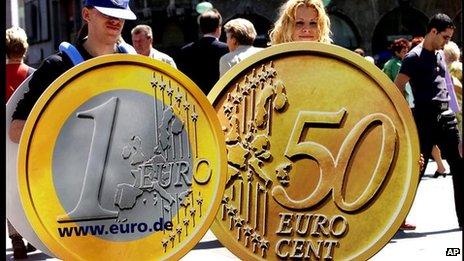Greeks reject German plan for EU budget commissioner
- Published

Greek officials have reacted angrily to a leaked German proposal for an EU budget commissioner with veto powers over Greek taxes and spending.
The Greek government said it must remain in control of its own budget.
The European Commission says it wants to reinforce its monitoring of Greek finances, but Greece should retain sovereign control.
Meanwhile, Greece and its private investors are close to a deal which will pave the way for a second bailout.
Greek government spokesman Pantelis Kapsis told the BBC the discussions between the two parties had gone well and they were "close to an agreement".
Greece must reach agreement in the next few days in order to receive the next tranche of funds from its first bailout.
It needs the money to pay off a significant number of bondholders whose bonds mature in March. Without the bailout funds, Greece could be forced into an uncontrolled default from the euro.
'Budgetary sovereignty'
Under the German proposal, a budget commissioner would have veto powers over Greek budgetary measures if they were not in line with targets set by international lenders.
Greece would also legally commit itself to servicing its debt, before spending any money in any other way.
"Given the disappointing compliance so far, Greece has to accept shifting budgetary sovereignty to the European level for a certain period of time," the Financial Times quotes the German plan as saying.
Mr Kapsis, the spokesman for the centre-left Pasok party, one of the parties in Greece's coalition government, said Greece's budget was "the responsibility of the Greek government and there is no need for such measures".
He said a similar idea had been raised before and should be avoided.
"We have gone a long way in reducing our deficit and are on the right track," he added.
Under the proposals, European institutions already operating in Greece should be given "certain decision-making powers" over fiscal policy, a German official told the Reuters news agency. He was speaking on condition of anonymity.
The German plan was leaked ahead of a meeting of EU leaders in Brussels on Monday, when they will discuss a new fiscal pact.
Anyone looking for a clear sign that Germany and its fiscally conservative allies are losing patience with Greece should look no further, says the BBC's Chris Morris, in Brussels.
Because Greece has repeatedly failed to meet earlier fiscal targets, and has made little progress on public-sector reforms, there is concern that even with a deal on the next bailout, Athens may need more than the 130bn euros agreed last October, our correspondent says.
Debt swap
Meanwhile, Greek officials and private investors struck an optimistic note as talks wound up on Saturday, saying they were close to reaching agreement.
They were discussing a debt swap, under which private creditors take a 50% cut in the nominal value of their Greek bond holdings, in return for cash and new bonds.
The swap would relieve Greece of about 100bn euros of its total debt of 350bn euros.
"We must do everything that will restrict the recession and will begin the cycle of growth. The coming days will determine the coming decade," Finance Minister Evangelis Venizelos told reporters as the talks broke up on Saturday.
In return for the first bailout, Greece agreed to sharply reduce public spending, including cuts in pensions and wages for public-sector workers.
However, it has repeatedly fallen short of its targets. Last year, the budget deficit went up, not down.
The austerity measures have angered many Greeks. In Athens on Friday, protesters tried to blockade inspectors from the "troika" of institutional lenders - the EU, the International Monetary Fund (IMF) and the European Central Bank (ECB) - into their hotel.
Elections in Greece are due to take place in April.